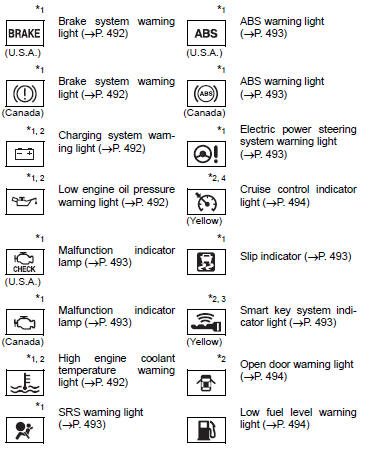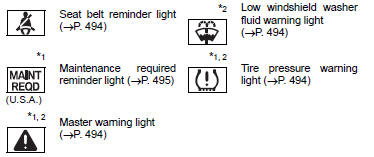Toyota Corolla (E170) 2014–2019 Owners Manual / Instrument cluster / Warning lights and indicators / Warning lights
Toyota Corolla (E170): Warning lights
Warning lights inform the driver of malfunctions in the indicated vehicle’s systems.


*1: Vehicles without a smart key system: These lights turn on when the engine switch is turned to the “ON” position to indicate that a system check is being performed. They will turn off after the engine is started, or after a few seconds. There may be a malfunction in a system if a light does not come on, or if the lights do not turn off. Have the vehicle inspected by your Toyota dealer.
Vehicles with a smart key system: These lights turn on when the engine switch is turned to IGNITION ON mode to indicate that a system check is being performed. They will turn off after the engine is started, or after a few seconds. There may be a malfunction in a system if a light does not come on, or if the lights do not turn off. Have the vehicle inspected by your Toyota dealer.
*2: If equipped
*3: The light flashes in yellow to indicate a malfunction. The light flashes quickly
in green to indicate that the steering lock has not been released.
*4: The light comes on in yellow to indicate a malfunction.
Other materials:
Starting the engine
1 Check that the parking brake is set.
► Vehicles without a multi-information display
2 Continuously variable transmission: Check that the shift lever is set in P.
Firmly depress the brake pedal.
Manual transmission: Check that the shift lever is set in N. Firmly depress the
clutch peda ...
Replacement
1. Remove clutch start switch assy
disconnect the clutch start switch assy connector.
remove the nut and clutch start switch assy from the clutch pedal
support.
2. Install clutch start switch assy
install the clutch start switch assy with the nut.
Torque: 15.68 Nv ...
Circuit description
The side squib (lh) circuit consists of the airbag sensor assy center and
front seat airbag assy (lh).
It causes the srs to deploy when the srs deployment conditions are satisfied.
Dtc b0115/47 is recorded when a short is detected in the side squib (lh)
circuit.
Wiring diagram
...


